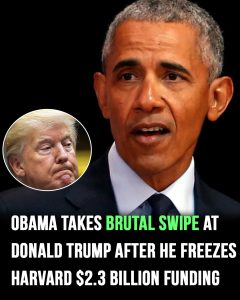There’s no denying the deep political divide that exists between former President Barack Obama and former—and now current—President Donald Trump. Though they were photographed sharing a moment of laughter during Jimmy Carter’s memorial service, their opposing views remain stark and uncompromising. That contrast became even more evident earlier this month when Obama spoke at Hamilton College in Clinton, New York. During his address, he made pointed remarks about Trump, expressing profound concerns about the direction the government has taken under his administration.

“I have deep differences of opinion with my most immediate successor — who’s now president once again,” Obama said. His tone was serious, and his words were chosen carefully. He continued by saying there are numerous policies he feels strongly about, emphasizing his belief that the government’s commitment to core democratic values has diminished over time. The statement didn’t merely reflect personal distaste; it highlighted what he considers a broader erosion of principles fundamental to American democracy.
One of the issues that particularly unsettles Obama is the Trump administration’s treatment of Harvard University — an institution with which he shares a deep personal and academic connection. After all, Obama earned his law degree from Harvard Law School, and his time there played a crucial role in shaping his legal and political career. That’s why the recent conflict between the university and the federal government feels especially personal.
The controversy began when the U.S. Department of Education decided to freeze $2.3 billion in federal funding allocated to Harvard. This dramatic move followed Harvard’s refusal to comply with a set of sweeping demands from the Trump administration. These demands included dismantling the school’s diversity, equity, and inclusion (DEI) initiatives, banning masks at campus protests, enforcing merit-based hiring and admissions reforms, and curtailing the influence of faculty and administrative staff — whom the administration accused of prioritizing activism over academic excellence.
The White House justified its actions by stating that the measures were designed to combat antisemitism on college campuses. However, the breadth and tone of the demands sparked immediate backlash from Harvard and the broader academic community. Harvard’s President, Alan M. Garber, responded publicly and firmly. “The University will not surrender its independence or its constitutional rights,” he said in a statement released Monday. His stance signaled that Harvard would not bow to political pressure, even at the risk of losing billions in funding.
Garber’s response marks a bold and unprecedented stand for an Ivy League institution. According to reports by CNN, Harvard is the first elite university to openly resist the current administration’s directives — and it may not be the last. The message is clear: academic independence and constitutional freedoms are non-negotiable, regardless of which party holds power in the White House.
As tensions escalate, Barack Obama has officially entered the fray. Using his platform on X (formerly known as Twitter), the former president lent his voice to Harvard’s cause and issued a strong rebuke of the Trump administration’s approach. “Harvard has set an example for other higher-ed institutions – rejecting an unlawful and ham-handed attempt to stifle academic freedom, while taking concrete steps to make sure all students at Harvard can benefit from an environment of intellectual inquiry, rigorous debate and mutual respect,” he posted. “Let’s hope other institutions follow suit.”
Obama’s support not only lends significant weight to Harvard’s position, but it also raises the stakes for other academic institutions across the country. With a figure as prominent as the former president backing the university’s stance, the spotlight now shifts to how other schools will respond. Will they align with Harvard and assert their autonomy, or will they comply with federal pressure in exchange for funding?
This growing conflict between Harvard and the federal government is about more than a single policy disagreement. It has sparked a broader national conversation about the future of higher education in the United States. Central to that discussion are critical questions: Who gets to decide what students learn? Should educational institutions be forced to conform to political agendas? What happens when academic freedom is pitted against government funding?
Supporters of Harvard argue that the university is standing up not only for its students and faculty but for the broader principles that underpin a free society — the freedom to question, to explore controversial ideas, and to foster meaningful debate. Opponents, on the other hand, argue that universities have strayed too far into ideological territory and need oversight to ensure balance and accountability.
Regardless of where one stands politically, the implications of this battle are significant. As Harvard holds firm and as figures like Obama rally to its side, the pressure is now on other institutions to take a stand. This is more than just a clash between one university and one administration — it is a defining moment for American higher education.
Will other universities have the courage to resist political coercion? Or will the lure of federal dollars prompt them to compromise on academic values? In the coming months, we’ll likely see more schools forced to confront these difficult questions.
One thing remains certain: this issue isn’t going away anytime soon. The battle over academic freedom, government influence, and the future of education in America is just beginning. What happens next will not only shape the landscape of higher learning — it will also help define the broader identity of American democracy in the years to come.





